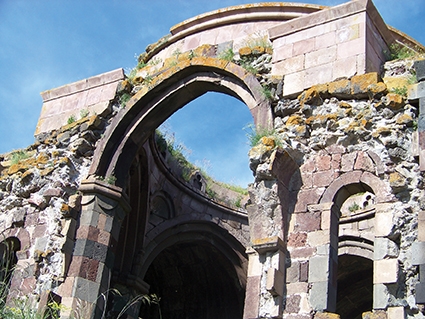National Interests & Georgian-Armenian Relations
Op-Ed
Something is surely going on in Georgian-Armenian relations. It’s been months since Official Tbilisi diplomatically refused to accept the candidate presented by Armenia for the post of Ambassador of Armenia to Georgia. This was preceded by a delicate refusal to open the transport corridor to Tskhinvali and that’s leaving aside the constant disagreement with Armenian officials arriving from Yerevan to talk about historic monuments.
Now it seems that these events have affected the everyday relations between the two nations, since recently the Armenian diaspora kicked out Georgian restorers who came to their village (Kumurdo) to fix a church.
The so-called “Armenian Bomb” that the political analysts have been referring to from the times of the Soviet Union nearly blew up last week in Kumurdo. All the fuss was about a 10th century Georgian church which is due for a complete rehabilitation to allow it to be used actively. The local Armenian “movement” made to hinder this process: for now, until the “favorable moment” arrives, they prefer it to stay as it is, rather than become an active Georgian church. They are especially against holding the (Greek-style) liturgies in the Georgian language. Obviously, the monument is Georgian, proven by the preserved inscriptions and frescoes on the walls. In order to delay the restoration works, locals arranged a burial in the churchyard and decided to put a holy stone cross on it. The National Agency of Cultural Monument Protection holds the position that the burial should be moved outside of the yard and the stone cross erected there. The Armenian diaspora is against this and has threatened to start a “war.” Experts believe, that this is a very well-planned action and that if the government compromises this time, it may later evolve into pretension from the Armenian side to take ownership of said Georgian church.
“Nobody can convince me that two or three citizens thought of burying remains in the churchyard and putting a cross on it, which in future might perfectly serve as an argument for the Armenian church,” said political analyst Soso Tsintsadze. “Tomorrow or the day after, Armenian officials might well arrive and declare that Armenians have sacrificed their lives to the construction of the church and so on. This is a well-planned action for future and I don’t believe they are in any sense doing this for the remembrance of their ancestors. Such cases are the reason Georgia have not accepted the Armenian Ambassador’s candidacy. Now, by all means, we shouldn’t allow our government to compromise to comfort the locals and get votes in the upcoming elections”.
We don’t know whether the issue of restoration of the Church in Kumurdo village is directly linked with the case of the ambassador, because diplomatic circles never make these nuances public. The candidate of Armenia Sergei Minasian comes from Javakheti and is Deputy Director and Head of the Political Studies Department at the Caucasus Institute in Yerevan; he is a political analyst and has been working on Georgian-Armenian relations for years. Armenian media reports, “The issue of Minasian’s appointment has been drifting ever since the delegation from the National Council arrived to Tbilisi headed by Baloian, who raised the issue at a meeting with Mikheil Janelidze, the Minister of Foreign Affairs of Georgia. Official Tbilisi remained silent, thus implying to Yerevan that they should have offered another candidate,” wrote the Armenian newspaper Zhamanak.
Regardless of today’s diplomatic nuances and restoration issues, the history of these “modern” relations is quite old in reality. Political analyst Mamuka Areshidze recalls feeling aggression from locals as early as in 1986, when he visited Kumurdo village together with an archeological expedition. “We won’t let you restore it, it is our temple.” “I remember that one of the main goals of our visit was not only examining the church, but also my journalistic interest following the fact that the students from the faculty of restoration where beaten by locals. Armenian locals are convinced that this is an Armenian historical and cultural monument and that their ancestors are buried there under the floor of the church; they also claim that the inscriptions are made in the Armenian language when in reality they are undoubtedly Georgian. But they do not wish to consider these arguments,” he says.
Despite the historical ignorance of locals, it is still very doubtful that there were no special provocateurs behind the recent fuss around the church: more likely they had specific future plans and are waiting for a favorable moment to seize the monument. Everything will now depend on the political and diplomatic skills of the government. If others know how to choose the “right” moment, shouldn’t we also learn it in order to fulfill our national interests?
Zaza Jgarkava











